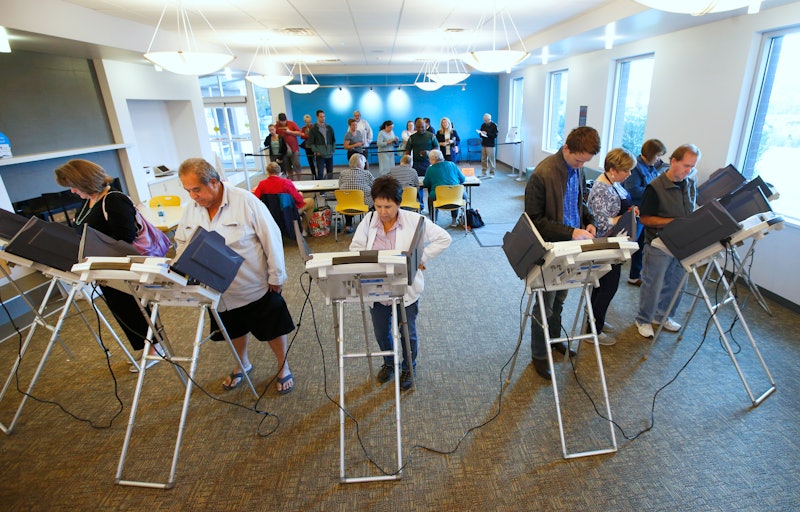News
No, Vote Flipping Won't Rig The Election
Early voting has already started in more than 30 states, and with it has come one of America's most storied traditions — complaining that the voting system is rigged. Thursday morning, Donald Trump tweeted his latest claim that the system is unfair to him, saying, "A lot of call-ins about vote flipping at the voting booths in Texas. People are not happy. BIG lines. What is going on?"
What is going on? Unlike Trump's evidence-free claims of a "rigged" election, there have been actual reports of voters finding that when they try to choose one candidate on an electronic voting machine, the machine automatically switches their vote to another one. Obviously, this is disturbing to voters, and has left many scared that the election will be stolen from them right in front of their noses.
But as a means of stealing the election, "vote flipping" is pretty absurd — if you press one choice and a different one lights up, you know that something is wrong, and have an immediate recourse to fix it, either by pressing the right button again or notifying an election worker of the issue and asking for a different machine, a paper ballot, or a do-over.
Still, vote-flipping, along with fears of voter fraud or vote suppression, is a stark event that causes many to worry about the sanctity of the election. A 2008 Halloween special from The Simpsons joked about this fear:
There is no evidence that there is any intentional vote-flipping. There is, however, lots of evidence that the country's voting machines are old, outdated, and not working as well as they should. Even if this does not lead to an epidemic of stolen votes, it's a real problem — in no small part because it increases the fear that elections could be rigged, which in turn could undermine the sanctity of the whole election and discourage people from voting.
And even when it's accidental, in an extremely close race, there can be real implications of voting irregularities. The 2000 presidential election ended up hinging on 537 votes in Florida. In Palm Beach, problems with ballot design led to thousands of votes not counting. Now, 16 years later, many Democrats still complain about the Florida recount.
At the time of writing, Clinton is predicted to win by a solid margin, so it is unlikely that any of these voting irregularities could have real impact. But problems with voting machines highlight a deeper and consistent problem of how badly managed our election system is. Every state has its own separate election, with individual counties and precincts taking over many of the specifics. Rules and procedures are far from consistent. Already, there are legal battles between the parties over administration of voter ID and voter registration deadlines, and complaints of long lines due to insufficient polling places. America needs to fix its creaky voting system, and antiquated voting machines that flip votes are an important place to start.
